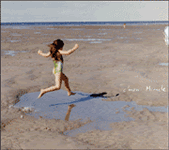|
|
 |
Dusted Reviews
Artist: Mirah Album: C'mon Miracle Label: K Review date: May. 3, 2004 |

|
|
|
 |
Mirah Yom Tov Zeitlyn is worthy of adoration. The demure, blithe Philadelphia-based singer and songwriter (she recently moved back home from Olympia) possesses a gorgeously girlish soprano, which befits her lyrical sensibilities, although she employs it at times for less than pure ends. Also, while her gentle, personable debut, You Think It's Like This But Really It's Like This, may have included a few underdeveloped tunes, and the adventurous production of its successor Advisory Committee sometimes worked at cross-purposes to the songs themselves, Mirah's first two albums are remarkably charming collections of quasi-folk with some exquisite songwriting.
C'mon Miracle, her third proper full-length, doesn't stray far from the strengths of the first two, falling perhaps somewhere in between them in terms of tone. If anything, it’s a touch less playful (no more inexplicable cries of "applesauce!"). It's also her most self-assured release yet, instantly inviting and comfortable, brimming with a confidence that breeds fast familiarity.
Right off the bat, the sparse "Nobody Has to Stay" contrasts with Advisory Committee's epic opener "Cold, Cold Water," with a delicately plucked guitar and quietly moaning strings accompanying Mirah's pleas for compassion in a lonely world. The slightly more rocking "Jerusalem" expands that plea from the personal to the geopolitical, while "The Light" broadens it even further with what seems to be a direct address to the divine: "[we'll] tremble before your valor if you just get down on your knees / and promise to all your children true that you will live in peace." This opening triptych sets a strikingly diverse sonic palette for such an unassuming record, and it is just a taste of the loveliness that is to follow.
The luscious "Don't Die in Me" navigates between lilting indie-folk and an intoxicating samba groove. "We're Both So Sorry," another standout, opens with a few spare autoharp strums, then adds trombone choir and some wispy double-tracked vocals before exploding into a sublimely surreal cavalcade of dubby distorted clicks and psychedelic flutes. The lyrics progress from straightforward nostalgic melancholy to a barrage of rather rancorous one-liners and deftly woven monarchical imagery. Similar lo-fi trickery (the production hallmark of Phil Elvrum a.k.a. Mr. Microphone), as well as marimba, harp, and accordion, pop up elsewhere in the album, serving always to embellish, and never to detract from, the deceptive simplicity of the songs.
Perhaps because of her understated, nuanced approach and the range of emotions and themes she addresses, Mirah's albums tend to feel like progress reports rather than definitive statements. It may be that she will never release a "masterpiece" (though eventually historicizing consensus is bound to designate one, because that's the way rockcritdom - and fandom – works.) There's something rather cold and impersonal in that idea, and that's the antithesis of Mirah's music.
By K. Ross Hoffman
|







